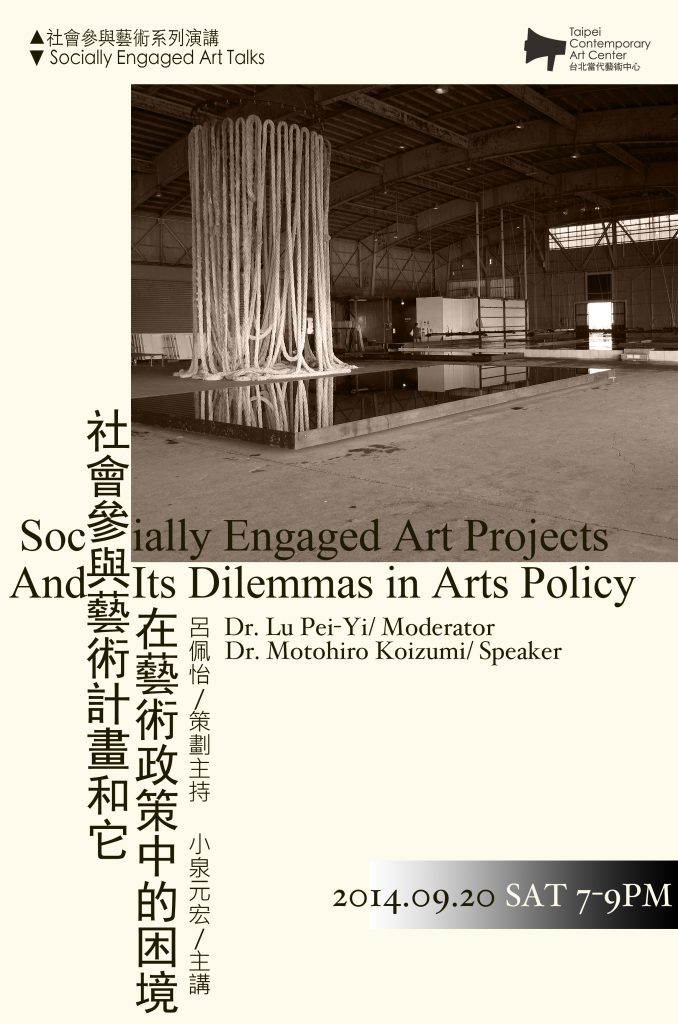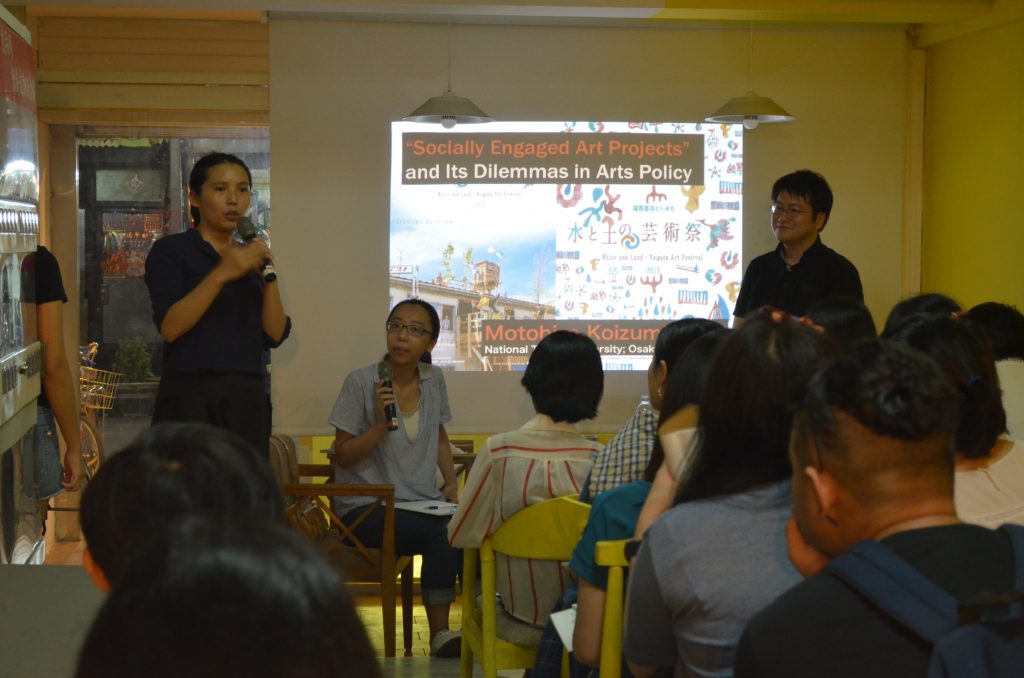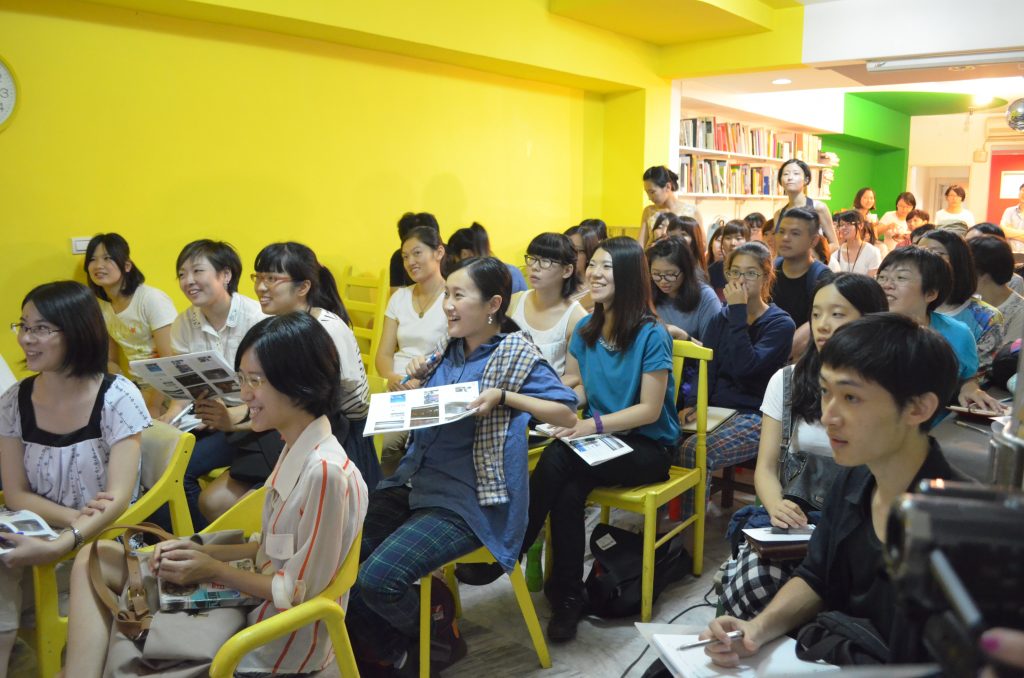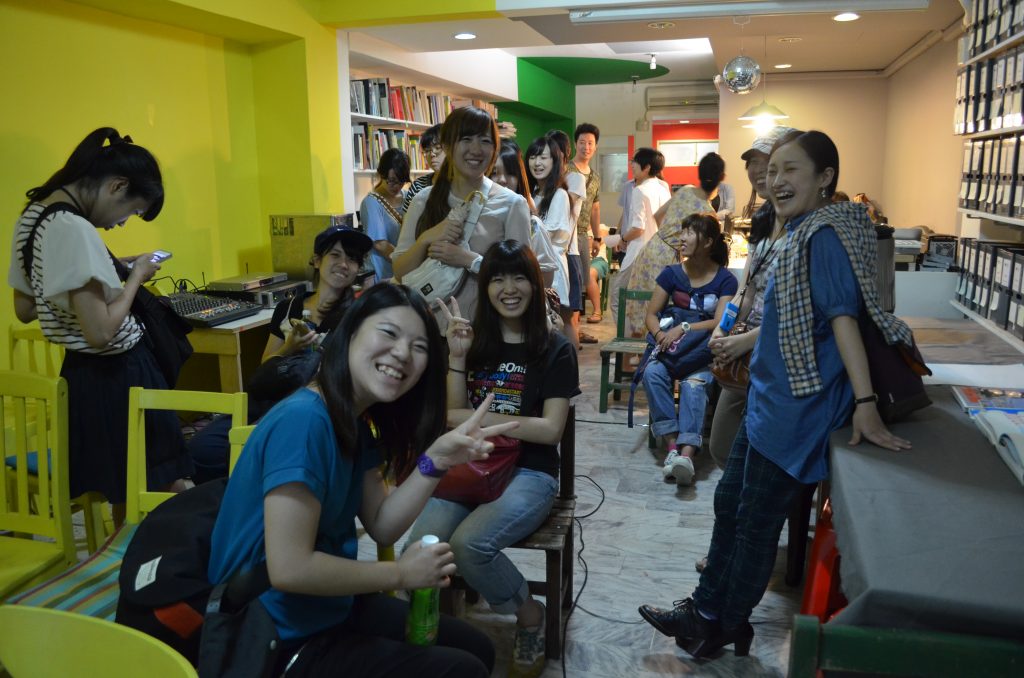2014.09.20 SAT 7-9PM
社會參與藝術系列演講一:社會參與藝術計畫和它在藝術政
策劃主持:呂佩怡|主講:小泉元宏
Moderator: LU Pei-Yi|Speaker: Motohiro Koizumi
本場座談將以中日文進行,並附有逐句翻譯。
The talk will be in Japanese and Chinese with consecutive translation.
For English please scroll down.
社會參與藝術系列演講
社會參與藝術系列強調人的主體性與能動性,認為人類的作
Socially Engaged Art Talks
The series of Socially Engaged Art Talks emphasizes on the subjective and initiative of human being. It suggests that as human being making progress in daily life it also causes inevitably crisis to endanger the environment and our society. These consequences must be resolved by the people. The practice of Socially-engaged art, participatory art or Social Practice takes art as a starting point. Through collaboration, participation, connection, relationship building, social issues can be perceived and the idea of “let’s do something together” is emerged.
This series will examine the relationship between art and society through several different forms: Scholars provides lectures and the issues relating to Socially Engaged Art practice and dilemma in different regions, such as Japan, China, France and so on; Artists conducta conversation sharing their cross-regional experiences in Socially Engaged Art. Also, a roundtable discussion and a book launch will be held.
社會參與藝術計畫和它在藝術政策中的困境
這場講座試圖檢視日本社會參與藝術(Socially Engaged Art)的藝術計劃,並就其對於城市與地方社區的重要性
日本城鄉社區正在發展的藝術計畫往往是立足人們的合作,
此類計畫的其中一例便是大地的藝術季(日本十日町市、津
本場講座將探討,在全球化趨勢的脈絡下,遍及地方社區的
呂佩怡/策劃主持
策展人,研究者,藝評人。倫敦大學人文與文化研究博士,
小泉元宏/主講
小泉元宏博士是一位社會學家,專攻藝術政策和管理。曾於
Socially Engaged Art Projects and Its Dilemmas in Arts Policy
This talk attempts to examine Japanese Art Projects with Socially Engaged Art in terms of their significance and issues that they present in urban and regional communities.Japan’s society has seen major transformations in its art scene since the 1990s, especially since the 2000s. Although the boom in construction of museums and other cultural facilities that was in full swing in the 1970s and 1980s has subsided, a new type of creative activities, ‘Art Projects’ have emerged at various sites such as at abolished schools closed due to a severe depopulating society in Japan, and disused factories closed due to changes in industrial structures, with the society moving from the Fordism to Post-Fordism production system.
Japanese art projects being developed in urban and rural communities are often activities based on cooperation among people, with artists―not necessarily artists who produce ‘Relational Art’ (Bourriaud 1998), or ‘Socially Engaged Art’―and others who work in the field of art deeply involving individuals outside the art world. The primary reason for this is that many art projects in Japan are publicly funded, aiming for regional revitalization and regeneration against the backdrop of an ageing population and global urban competition. Consequently, art projects are undertaken to boost the community through means such as involving several volunteers and local residents. As a result, art projects often focus on human cooperation and relationship building. Thus, although art projects in Japan tend to involve a variety of art forms that are not socially engaged art, they comprise activities that could easily be termed as momentous works of relational or collaborative art. In other words, making a collaborative art project is equivalent to ‘making Socially-Engaged Art Projects’ (Koizumi 2011).
One example of such projects is the Echigo-Tsumari Art Trienniale (Tokamachi City and Tsunan Town), which has been held since 2000 in a small city and a mountainous area. Other examples include Beppu Contemporary Art Festival “Mixed Bathing World” (Beppu City) started in 2007 respectively at hot spring resort city; the Water and Land -Niigata Art Festival (Niigata City), also initiated in 2009; and the Aichi Triennale (Nagoya City) in 2010 and 2013.
This talk investigates how the expansion of these ‘Socially Engaged Art Projects’ throughout regional communities should be perceived under the diversity of ‘community’ in the context of the trends of globalization. Specifically, on the basis of extensive field research, Koizumi attempts to examine ‘Socially Engaged Art Projects’ in terms of their significance and issues they present in urban and regional communities.
Dr. LU Pei-Yi/ Moderator
A researcher, art critic and curator. She awarded PhD in humanity and Cultural Studies from University of London. Her research interests are off-site art, museum studies and curating in theory and practice. Recently, a research-based book Contemporary Art Curating in Taiwan Two Decades is going to be published. She is an associate curator of 8th Shenzhen Sculpture Biennale “We Have Not Participated” (2014). She had been as an assistant professor of Museum Studies MA, National Taipei University of the Arts and served as a visiting assistant professor in Cultural Management MA, Chinese University of Hong Kong. She is teaching part-time in Fine art school, National Taipei University of the Arts and National Taipei University of Education.
Dr. Motohiro Koizumi/ Speaker
Dr. Motohiro Koizumi is a sociologist who specializes in Art Policy and Management. Koizumi was a Researcher at the JSPS, the University of the Arts London (UAL), Osaka University, and the University of London. Now, Koizumi is an associate professor at National Tottori University (2011-), and also, actively engaging in teaching courses at International Christian University (2012-).
台北當代藝術中心由文化部及RC Art Collection贊助營運。
TCAC is sponsored by the Ministry of Culture and RC Art Collection.




